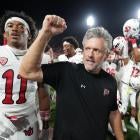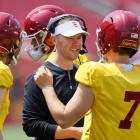College football athletic directors believe college football will be played this season, it's just a matter of when and how that season will look. According to a poll from Brett McMurphy of Stadium, 99% of Football Bowl Subdivision ADs said that football will be played in some form this season; whether that season starts on time, is delayed, shortened or played in the spring is another story.
Of the 130 FBS ADs polled, 114 responded to the survey. About 75% believe the season won't start on time -- which is to say that Week 0, scheduled to start on Saturday, Aug. 29, won't exist. To boot, 61% of the ADs polled believe season won't start until at least October while another 14% think it won't start until the spring semester of 2021, in either January or February. Additionally, 41% of the ADs asked said they believe the season, if it started in October or November, would have all 12 games. Only one Power Five AD said they didn't expect the season to be played at all.
That sentiment wasn't shared by the vast majority of those polled, however, regardless of whether they came from a Power Five or Group of Five program. Money, of course, was the driving reason as to why. "There's too much money at stake, it impacts too many people," a Power Five AD told McMurphy. "If there's no football, we will have bigger issues. This will be worse than the Great Depression and make the 1930s look like a cakewalk."
You can read the entire report here as it is perhaps the most complete view of how college football power brokers feel about the upcoming season. Of course, even within that near-unanimous feeling, there is division, something CBS Sports' Dennis Dodd discussed in length earlier this week. The future effects of COVID-19 have been hard to quantify because there's no simple answer without a vaccine.
To that end, believing the college football season will be played in some form might be wishful thinking. Obviously ADs want it to be played because of the media rights money at stake. Playing games without fans in the stands would hurt -- Ohio State AD Gene Smith, for example, estimates a $50 million loss if Buckeye games are played in an empty stadium -- but ticket sales make up a smaller portion of revenue that could be overcome. Not having football games at all could spell a nuclear winter for universities across the country.
Another layer to the situation is that college football players are students. In order for college football to be played, college campuses would need to be open. There have already been examples of some universities moving to online classes at the start of their fall semesters. What happens if some areas of the country are still heavily affected by the coronavirus come October -- around the time a second wave could begin -- while other areas are less affected? Health officials are still the go-to source for whether things can resume as normal.
There is no hard-and-fast answer, but the desire to stay afloat thanks to the cash cow that is college football has FBS ADs believing in the 2020 season. Whether that belief comes to fruition is another story.





















